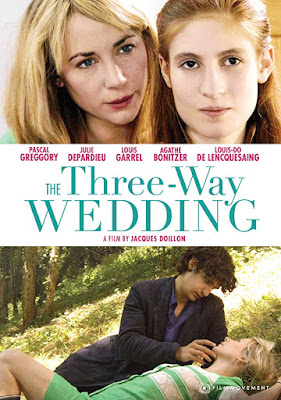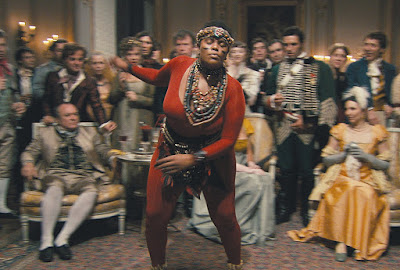Only the French, bless 'em, could have come up with a movie like THE THREE-WAY WEDDING (Le mariage à trois), in which a quintet of characters talk incessantly and intelligently about themselves, their ideas, their feelings and in particular their sexual and emotional needs but make it so goddamned interesting that you hang on almost every word. France, after all, is the country that gave us Molière and Marivaux -- to whom this film, written and directed by Jacques Doillon, owes plenty.

M. Doillon, shown at right, who recently gave us the not-so-well-received Rodin but earlier brought us the very well received Ponette, has created a tale of theater folk -- playwright, producer, actors and a novice assistant who, by film's end will soon be an actress, too -- who quite literally can't keep anything to themselves.
It's as though they have to give vent, via actions and words, to literally everything they think and feel. The fact they they're in the theater makes this somehow more believable (you know how theater people behave!), as well as making almost everything they say sound like dialog from a play. Fortunately, it's a rather good play.
Even better, Doillon has cast his film with a group of actors who could hardly be improved upon. In fact, their work here proves a near high-water mark for some of them (in TrustMovies' estimation, at least). The estimable Pascal Greggory (above, left, whose work in Those Who Love Me Can Take the Train and Doillon's Raja you may remember) is the playwright, and he is pitch perfect throughout: smart, witty, narcissistic beyond belief and every bit as controlling (and vulnerable) as you might expect a playwright to be.
As his "ex" and still-possible-paramour, Julie Depardieu (above, right, and further above) matches him moment for moment. Ms Depardieu is better here than I have ever seen her: emotionally on-point through so many highs, lows, and middles that her performance astounds. (One of the several fine things that Doillon's spill-it-all-out dialog succeeds in doing is giving us enormously full-bodied characters by allowing us to see and hear their innermost thoughts and desires.)
Louis Garrel (above, left) plays Depardieu's young actor/lover, and he is as fine as always, bringing his penchant for semi-snotty self-love to the fore and making the most of it. Each actor here manages to make fun of himself/herself (and amuse us in the process), even as s/he rounds out the character to its fullest.
As the pretty little assistant with the porcelain skin and gorgeous red hair, Agathe Bonitzer (above and below) imparts just the right sense of naivete coupled to the power that comes with the realization that one is desired. She makes a lovely and not-yet-too-theatrical addition to this little group.
I only wish that the excellent actor Louis-Do de Lencquesaing (at left in bottom photo) had been given a bit more to do. He is fine as far as his character is allowed to go, but that's not quite far enough.
A word must be said for Doillon's interesting "choreography" of his actors. They almost never stop moving about -- when they're talking, thinking, even in bed. This adds an extra little surge of energy to the film and to the performances Nothing is ever static here.
The Three-Way Wedding is such an oddball film for specialized tastes that I must recommend it with that caveat. But for folk who appreciate something brave, unusual and very well-executed, do take a chance on this one!
Perhaps via Amazon Prime...?




















































